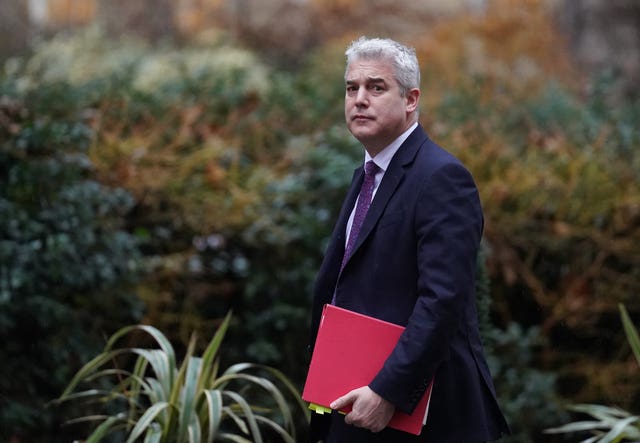
The Government is set to publish an urgent and emergency care plan on Monday, as the Health Secretary admitted that there was “no quick fix” to the serious pressures facing the NHS.
It comes as the Department of Health announced plans for tens of thousands of elderly and vulnerable people to receive tailored support at home each month, as part of a strategy to shift some NHS care out of hard-pressed hospitals.
Officials said that the plan would standardise and scale up current services to treat falls and frailty, with more services in place for next winter.
The Government said that the plan builds on the virtual wards already in place in the NHS, which see patients treated from home while monitored by medics either through daily visits or through video calls.

About 3,000 virtual beds are due to be created before next winter, with the plan set to suggest that about 50,000 people a month could be cared for from home under ministers’ ambitions.
The plan comes amid multiple reports that hospitals are struggling to cope amid severe pressures on staff, with walk-outs by nurses set to continue as a dispute over pay and conditions continues.
The latest data shows that ambulance handover delays outside hospitals in England have dropped to their lowest level this winter, but one in five patients are still waiting at least half an hour to be transferred to A&E teams.
Health Secretary Steve Barclay said that the plan would help ease pressure on stretched A&E services.
“The health and care service is facing significant pressures and while there is no quick fix, we can take immediate action to reduce long waits for urgent and emergency care,” he said.
He suggested that “up to 20% of hospital admissions are avoidable with the right care in place”.
“By expanding the care provided in the community, the most vulnerable, frail and elderly patients can be better supported to continue living independently or recover at home.
“This includes rolling out more services to help with falls and frailty as well as supporting up to 50,000 patients a month to recover in the comfort of their own homes. Not only will patients benefit from better experiences and outcomes, it will ease pressure on our busy emergency departments.”
NHS chief executive Amanda Pritchard said that the health service had faced a “twindemic” of flu and Covid-19.
“Our extensive planning ahead of winter has helped to boost capacity – from extra 111 and 999 call handlers, to new falls services and more beds – and we now aim to build on that progress to help speed up care and improve the experiences of patients.”
The plan will see urgent community response teams scaled up, with hopes that it will increase the number of referrals and patients seen by healthcare staff within two hours.
The Government pointed to £14.1 billion available for health and care services over the next two years, as announced in the autumn statement.
James Jamieson, Chairman of the Local Government Association, said: “We are pleased to see the focus on expanding community health and care services and the recognition of the importance of therapy and recovery support to get people back home following discharge.
“Collaboration and a focus on outcomes will be key to successful delivery of the plan.”


Why are you making commenting on The National only available to subscribers?
We know there are thousands of National readers who want to debate, argue and go back and forth in the comments section of our stories. We’ve got the most informed readers in Scotland, asking each other the big questions about the future of our country.
Unfortunately, though, these important debates are being spoiled by a vocal minority of trolls who aren’t really interested in the issues, try to derail the conversations, register under fake names, and post vile abuse.
So that’s why we’ve decided to make the ability to comment only available to our paying subscribers. That way, all the trolls who post abuse on our website will have to pay if they want to join the debate – and risk a permanent ban from the account that they subscribe with.
The conversation will go back to what it should be about – people who care passionately about the issues, but disagree constructively on what we should do about them. Let’s get that debate started!
Callum Baird, Editor of The National
Comments: Our rules
We want our comments to be a lively and valuable part of our community - a place where readers can debate and engage with the most important local issues. The ability to comment on our stories is a privilege, not a right, however, and that privilege may be withdrawn if it is abused or misused.
Please report any comments that break our rules.
Read the rules here